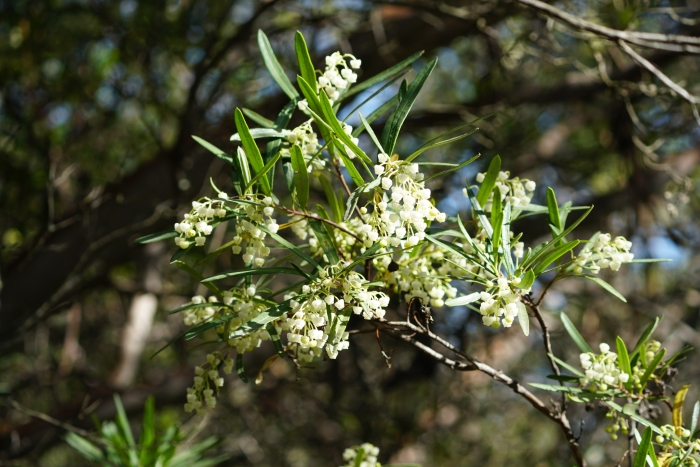Baja Birdbush
(Ornithostaphylos oppositifolia)
Baja Birdbush (Ornithostaphylos oppositifolia)
/
/

Kristen Francis
Public Domain
Image By:
Kristen Francis
Recorded By:
Copyright:
Public Domain
Copyright Notice:
Photo by: Kristen Francis | License Type: Public Domain | License URL: http://creativecommons.org/publicdomain/zero/1.0/ | Rights Holder: Kristen Francis | Publisher: iNaturalist | Date Created: 2021-03-21T22:43:16Z |


















Estimated Native Range
Summary
Ornithostaphylos oppositifolia, commonly known as Baja Birdbush, is an evergreen shrub native to the chaparral and coastal sage scrub regions of far southern California and Northwestern Mexico. It can be deciduous in drier conditions. This species typically grows to a height of up to 2 meters and is recognized for its burl-forming habit and its thin, smooth, reddish-purple bark that may peel off with age. The erect, rigidly branched stems are sometimes covered with minutely wooly hairs, adding a subtle texture to the plant’s appearance. The evergreen, leathery leaves are up to 8 cm long and 6 mm wide, arranged opposite or in whorls, which is a distinctive feature. During the flowering season, which occurs in late winter to early spring, Baja Birdbush produces a much-branched inflorescence of white, urn-shaped flowers that are quite showy and attract pollinators.
Baja Birdbush is valued for its drought tolerance and its striking appearance, making it a suitable choice for xeriscaping and as a specimen plant in gardens within its native range. It is also appreciated for its ability to adapt to rocky soils and its low water needs once established. In cultivation, it thrives in full sun and well-draining soils, and while it can survive with minimal water, occasional watering will keep it looking its best. It is hardy down to 12°F, making it suitable for many temperate gardens. However, gardeners should be aware that it may require protection from frost in colder climates.CC BY-SA 4.0
Baja Birdbush is valued for its drought tolerance and its striking appearance, making it a suitable choice for xeriscaping and as a specimen plant in gardens within its native range. It is also appreciated for its ability to adapt to rocky soils and its low water needs once established. In cultivation, it thrives in full sun and well-draining soils, and while it can survive with minimal water, occasional watering will keep it looking its best. It is hardy down to 12°F, making it suitable for many temperate gardens. However, gardeners should be aware that it may require protection from frost in colder climates.CC BY-SA 4.0
Plant Description
- Plant Type: Shrub
- Height: 4-6 feet
- Width: 4-6 feet
- Growth Rate: Slow
- Flower Color: White
- Flowering Season: Spring, Winter
- Leaf Retention: Evergreen
Growth Requirements
- Sun: Full Sun
- Water: Low
- Drainage: Medium
Common Uses
Low Maintenance, Salt Tolerant
Natural Habitat
Chaparral and coastal sage scrub regions of far southern California and Northwestern Mexico
Other Names
Common Names: Baja California Birdbush , Baja California Manzanita
Scientific Names: Ornithostaphylos oppositifolia , Arctostaphylos polifolia , Arctostaphylos oppositifolia , Arctostaphylos appositifolius , Arctostaphylos salicifolia , Onithostaphylos oppositifolia
GBIF Accepted Name: Ornithostaphylos oppositifolia (Parry) Small